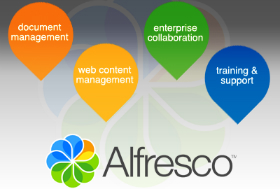Early Availability for the Alfresco ECM Platform on AWS
Alfresco Software, enterprise content management (ECM) and business process management (BPM) software provider, announced early access availability of its Alfresco platform as a single-tenant managed service hosted in an Amazon Web Services Virtual Private Cloud. Alfresco also released a new DevOps toolkit to help simplify cloud deployment for users managing their own AWS infrastructure. What do these mean for you?
 First things first, what is Amazon Virtual Private Cloud? Amazon VPC lets you provision a logically isolated section of the Amazon Web Services (AWS) cloud where you can launch AWS resources in a virtual network that you define and gives you more granular control over your virtual networking environment, including selection of your own IP address range, creation of subnets, and configuration of route tables and network gateways.
First things first, what is Amazon Virtual Private Cloud? Amazon VPC lets you provision a logically isolated section of the Amazon Web Services (AWS) cloud where you can launch AWS resources in a virtual network that you define and gives you more granular control over your virtual networking environment, including selection of your own IP address range, creation of subnets, and configuration of route tables and network gateways.
Now, let’s get back to the news. Alfresco made its content management solution available on AWS and, now, is offering it as a single-tenant, managed services sitting within an AWS Virtual Private Cloud (VPC), rather than multi-tenant public cloud offering. With the new offering, the vendor provides a robust content-centric platform allowing users to collaborate on business-critical content, all with the network isolation and security of a dedicated AWS Virtual Private Cloud (VPC), and without the dedicated internal resources for ongoing Alfresco and AWS management. The point here is to make complicated and confidential processes, which include a sheer amount of data, more streamlined in the cloud.
John Newton, Co-founder, CTO and Chairman of Alfresco Software, also explained the motivation behind  their new offering: “As security demands increase at the same time that data center costs rise, customers are looking for virtual private clouds to reduce costs and better secure critical business information. Large and regulated companies want airtight control of their mission-critical files, which can be over half the files in an organization, but without the hassle of huge data centers.”
their new offering: “As security demands increase at the same time that data center costs rise, customers are looking for virtual private clouds to reduce costs and better secure critical business information. Large and regulated companies want airtight control of their mission-critical files, which can be over half the files in an organization, but without the hassle of huge data centers.”
According to Alfresco, its enterprise customers increasingly entrust AWS with their workloads, so this announcement demonstrates that Maidenhead, UK-based ECM and BPM technology provider listens to its customers’ needs and takes actions accordingly. In one current use case, the United Cerebral Palsy (UCP) of Greater Chicago uses Alfresco on AWS to provide services to 176,000 people in Chicago. With Alfresco's platform, the UCP and its affiliates are delivering more than 11,000 digital documents to children, such as K-12 textbooks, interactive online exams, medical resources, videos and counseling information. Here’s the interview with Steve Clements, Director of Program Technologies for the United Cerebral Palsy Seguin of Greater Chicago, on how Alfresco on Amazon transformed the act of content management to a scalable business function:
With Alfresco on AWS, organizations can collaborate on content, track changes, review and approve content by also including external partners, if needed. Thanks to its modern REST APIs, users can integrate Alfresco into other systems that they already have in place. According to Alfresco, the platform easily can take care of delivering the right digital experience that is always up to date, secure and leverages native AWS services.
Alfresco’s ECM platform, Alfresco One, can handle over 1.2 billion documents on a full cloud-centric technology stack based on Amazon Elastic Compute Cloud (EC2) and the Amazon Aurora relational database engine. For those who prefer to design, deploy and maintain their own systems, Alfresco and AWS have collaborated to publish the Alfresco QuickStart, a collection of Reference Architectures, CloudFormation templates, documentation, and tools. Whether managed by Alfresco or directly deployed by the customer, Alfresco’s open source core platform offers open APIs and support for open standards so its customers extend, customize and integrate existing applications and processes in AWS.
Cloud-based ECM Solutions
According to Wikibon, the private cloud's market size is about $7 billion whereas the public cloud market is $25 billion. AWS's market share came in at $7.9 billion in 2015, which is larger than the entire private cloud market. On the flip side, the private cloud is still emerging. Who knows whether it will take over public cloud at some point? But it’s not what I want to discuss. Instead, I'd rather be discussing the benefits of ECM solutions hosted in the cloud.
The explosive growth of unstructured content is an issue for many organizations. In fact, According to the Economist, 80 percent of content used by knowledge workers for core revenue generation activities is unstructured while content is doubling every 90 days. To tackle regulatory and statutory requirements, most enterprises have started to captivate the power of the cloud. IDC expects spend on cloud software to double from $57.8 billion in 2015 to $112.8 billion in 2019.
Although cost-efficiency is the biggest factor when it comes to making any business decision, the benefits of moving to a cloud-based solution go beyond only cost reduction. At the end of the day, all organizations aim to deliver an agile digital experience to their prospects and customers. To do so, they need a complete control over their content. Orchestrating content is the point of implementing ECM platform in the first place, anyway. What’s the additional advantage of moving the ECM software to the cloud, then? You make it more accessible for employees and other authorized users. Accessibility is not beneficial only for collaboration but also security as people tend to get things done faster in an easier way. So when they need to share a file with a colleague, they will find a way to get it through less secure routes such as email, personal EFSS accounts, local copies, and USB thumb drives, whether they’re safe or not. Therefore, it’s always better to implement access to a sanctioned solution that at least keeps data safe.
Although many CIOs still hesitate to move to the cloud due to their security concerns, with the cloud, ironically, data can actually be more secure in many ways as an organization can keep sensitive corporate data behind the firewall. Also, when the data is on-premises, there are chances, organizations can simply lose it in the event of a natural disaster.
Cloud computing also frees organizations from the burdens of capacity planning, server and storage acquisition and configuration, network management, software procurement and installation, and application management. Furthermore, outsourcing datacenter management tasks to the ECM vendor enables an organization to focus more of its technical resources on innovation and IT investments that drive new business value.
Often, vendors offering ECM in the cloud operate datacenters in multiple geographies. This allows organizations to manage sensitive information in compliance with local laws. This is extremely important for organizations with business operations in Europe as they must comply with laws in different jurisdictions that implement provisions of the European General Data Protection Regulation (GDPR). Learn more about GDPR.
On the top of these, offloading the ownership and management of their hardware and software to the cloud provider reduces cost as the company no longer needs to allocate budget for buying and maintaining the hardware and software and moves the expense from an initial high capital cost to a more regular operational cost, not to mention, the reduction in staffing expenses.
After all, having your head in the clouds might actually not be a bad thing in this regard. However, it’s important to remember that like every other business initiative, the transition to the cloud is a journey where organizations should carefully explore their options in the context of their own unique paths. Strong integration capabilities and enterprise-grade information governance are the other important consideration points while evaluating.

Venus Tamturk
Venus is the Media Reporter for CMS-Connected, with one of her tasks to write thorough articles by creating the most up-to-date and engaging content using B2B digital marketing. She enjoys increasing brand equity and conversion through the strategic use of social media channels and integrated media marketing plans.